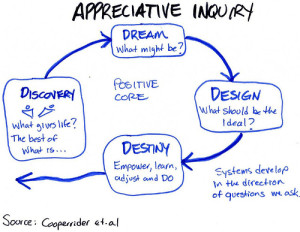
Appreciative Inquiry Process (cc) Chris Corrigan
Recently came across an interesting AI (no, not Appropriate IT…that is not the only AI in the world you know ;-)) – Appreciative Inquiry.
From The Soul of Money by Lynne Twist pg 131:
In their book Appreciative Inquiry: Toward a Positive Theory of Change, they suggest we shift our frame of reference from one of “problem solving” to one that seeks to identify the sources available in any collection of people for inspiring, mobilizing, and sustaining positive change.
How would our practices surrounding change be different, they ask, if we started with the positive assumption that “organizations, as centers of human relatedness, are alive with infinite constructive capacity”?
In appreciative inquiry we “search for the best in people, their organizations, and the relevant world around them.” Appreciative inquiry involves “systematic discovery of what gives ‘life’ to a living system when it is most alive, most effective, and most constructively capable in economic, ecological, and human terms.” Look for what’s working instead of what’s not, they say, and “instead of negation, criticism, and spiraling diagnosis, there is discovery, dream, and design.”
From Wikipedia:
Gervase R. Bushe[1] (2013) “Appreciative Inquiry (AI) is a method for studying and changing social systems (groups, organizations, communities) that advocates collective inquiry into the best of what is in order to imagine what could be, followed by collective design of a desired future state that is compelling and thus, does not require the use of incentives, coercion or persuasion for planned change to occur.”
For those whose interest was spiked by this snippet (as mine was), here are a few links to explore this further:
- Case Western University: Appreciative Inquiry Commons
- Wikipedia: The Basis of the AI Approach
